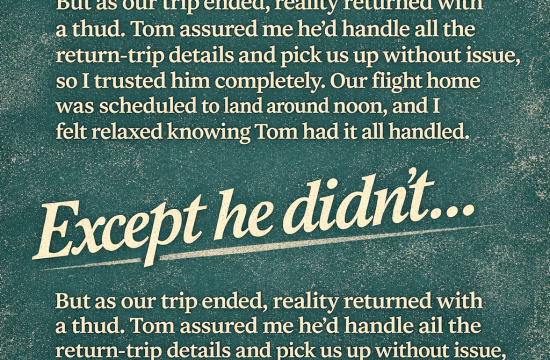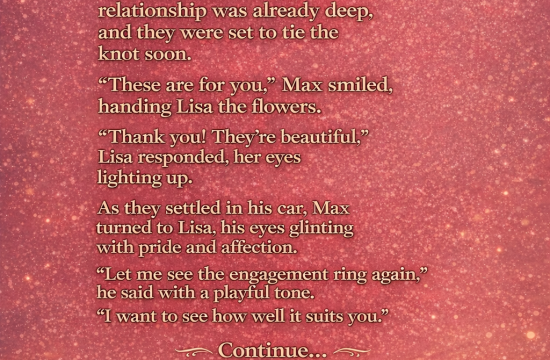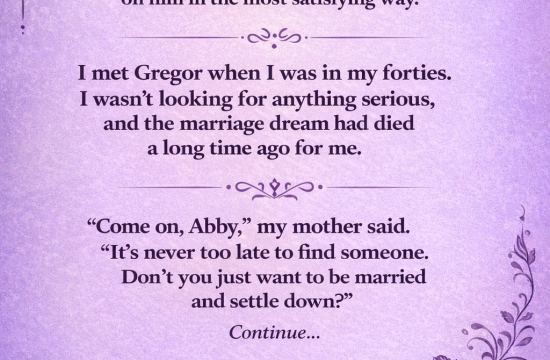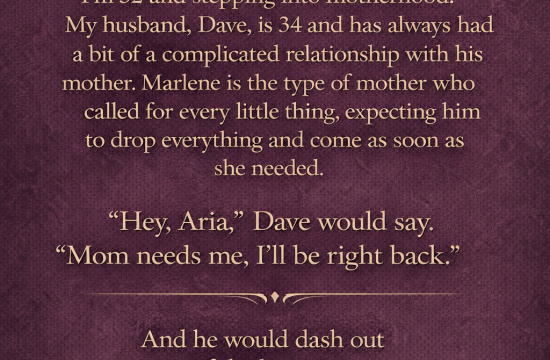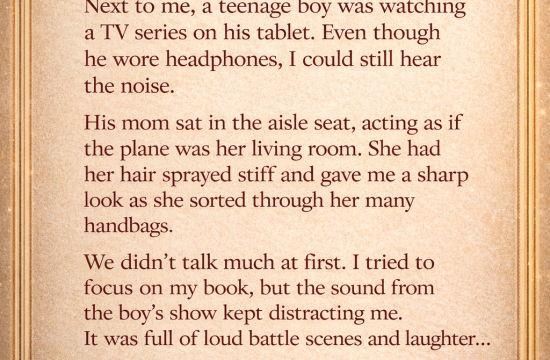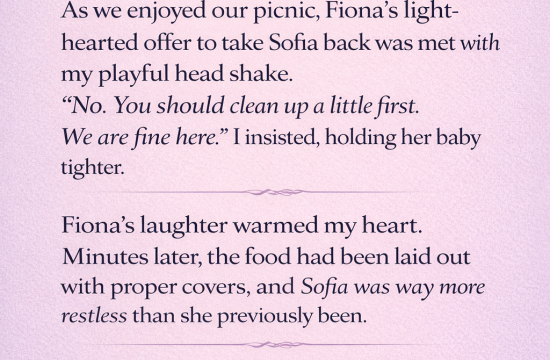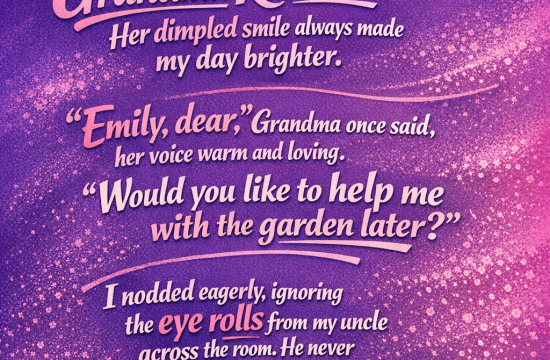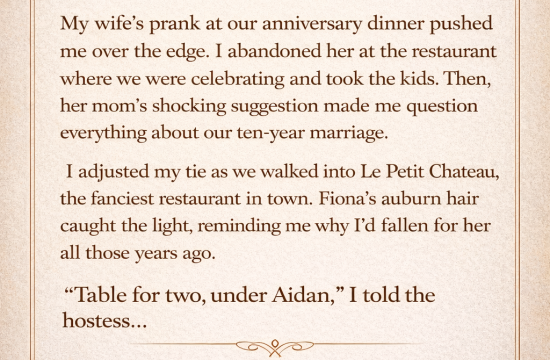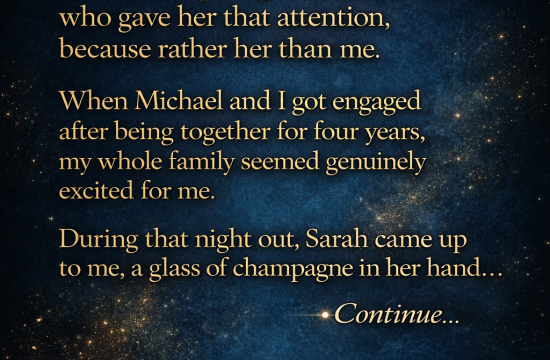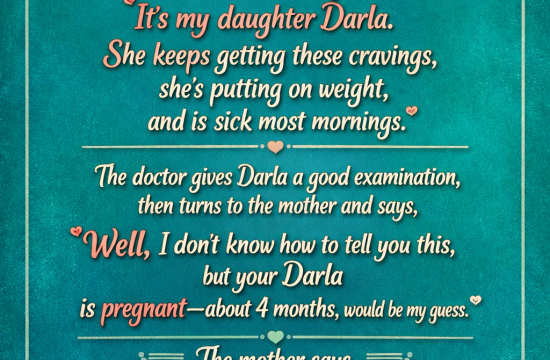I thought my boyfriend had planned the perfect romantic escape.
A luxury hotel suite. Soft lighting. Champagne on ice. A balcony overlooking the city like a postcard. For forty-eight hours, it felt like a life I could grow old inside.
Then checkout happened.
His card got declined.
Dorian turned crimson, fumbling for excuses. “The bank must’ve flagged it… I—I don’t know why—”
I didn’t want him to suffer. I didn’t want the magic to burn out right there. So I smiled, reached for my purse, and paid the bill.
But as we walked toward the exit, the receptionist gently tapped my arm.
“You’re being incredibly kind,” she whispered. “But you’re not the first woman this week.”
I felt the words like a cold draft through a warm room.
Not the first woman this week.
Before I could ask anything, she straightened, returned to her computer, and offered me a soft, apologetic smile—like she had already said too much.
That one sentence followed me through every mile of the drive home. It sat in the back seat with us. It breathed against my neck.
We’d been together almost a year. And yes—he was charming, spontaneous, and oddly generous with words, though never quite with money. He flaunted luxury watches he never wore, investments he couldn’t explain, Michelin-star obsessions he never seemed able to afford. And every time a bill arrived, it somehow migrated toward me.
I kept quiet because love makes you doubt your own discomfort. It makes you swallow questions whole.
But this time, the unease didn’t dissolve.
When we got home, curiosity and dread braided together. I searched the hotel’s Instagram out of sheer instinct. They’d posted guest photos in the suite we stayed in.
One was mine.
The other, just three days earlier, belonged to a woman named Renata.
Dorian had liked the picture.
I clicked her profile. It was elegant, curated, polished—but not superficial. And familiar.
As I scrolled, the familiarity sharpened into nausea.
There he was.
Dorian.
In her arms. Smiling wider than he ever smiled with me. The caption read:
“Grateful for you. Always.”
And it was five months old.
My pulse hammered in my ears. I kept scrolling because denial can be surprisingly strong. But every new post carved the truth deeper.
A bracelet I found once on my nightstand—hers.
A dinner reservation he claimed got canceled—showing up on her Story.
Him, wine glass in hand, sitting across from her.
This wasn’t infidelity.
It was an entire architecture of lies.
I screenshotted everything. My hands shook, but not because I wanted to cry.
It was because I knew what I had to do.
I messaged her.
“Hi. You don’t know me, but I think we need to talk. It’s about Dorian.”
She replied in less than an hour. We met at a café—neutral ground for emotional warfare neither of us started.
Renata walked in looking composed, though her eyes betrayed a storm. We exchanged timelines, receipts, screenshots.
It was horrifying how neatly our stories overlapped.
He told her he traveled for work—same lie he fed me.
She thought he visited family when he was with me.
I thought he was working late when he was with her.
We bonded over betrayal—two strangers linked by the same wound.
We didn’t want revenge. We wanted truth laid bare.
So we crafted a plan.
The following weekend, I invited Dorian over for a special dinner. I set the table like a scene from a romance film—candles glowing, pasta simmering, soft music floating in the background.
He walked in with roses, kissing my cheek as if nothing in the world was fractured.
Halfway through dinner, a knock came.
I opened the door and stepped aside.
Renata walked in.
Dorian froze mid-chew. For a second, he resembled a statue—one carved to hold both guilt and shock in equal measure.
She sat across from him and folded her hands.
“So,” she said calmly, “which one of us were you planning to marry?”
He sputtered, stuttered, tried to play confusion—but the truth hung in the air like spilled wine.
“This isn’t—this isn’t what it looks like.”
“It’s exactly what it looks like,” I replied.
There were no screams. No broken plates. No melodrama.
Just the sound of a lie collapsing under its own weight.
He left in a rush—muttering nonsense excuses neither of us needed to hear. The door slammed, and with it, the spell he had cast on both our lives shattered.
Renata and I sat at the table he had contaminated with deceit.
Silence.
Then a laugh—hers first, then mine.
Not joyous. Not mocking. Just… freeing.
We hugged before parting and promised to stay in touch.
In the weeks that followed, I deleted Dorian from my life in quiet, methodical steps—block, delete, unsubscribe, unremember. I changed my locks. Canceled our joint gym membership. Donated the shirt he left behind.
But life wasn’t done surprising me.
Months later, at a backyard party, I met Bram.
No swagger. No curated persona. No grand illusions.
Just a man offering to help carry drinks, cracking dad jokes that weren’t even good… but warmed the air around him.
We didn’t flirt. We simply talked. And it felt like oxygen.
We kept bumping into each other—at community events, at the bakery, once even at the gas station. It felt unplanned, but never unwelcome.
Our first date wasn’t extravagant. Just coffee and a walk. But for the first time in ages, I felt safe.
He didn’t try to dazzle me.
He didn’t pretend.
He didn’t perform.
He was simply himself—present, consistent, real.
One night, I told him the whole story about Dorian.
He didn’t offer pity. He didn’t offer solutions. He simply listened.
Then he said:
“Sounds like the kind of thing that teaches you what not to ignore next time.”
It was simple—but it stuck.
Because he was right.
I’d ignored my instincts for too long. I’d mistaken grand gestures for genuine love, charm for commitment, fantasy for truth.
Now I knew better.
Real love isn’t dramatic.
It’s steady.
It’s honest.
It’s ordinary in the most extraordinary way.
Renata and I still message sometimes. She started a dating blog about red flags—turning pain into power. She says we dodged an eternity of lies.
And she’s right.
That weekend in the luxury hotel?
I thought it was the beginning of something beautiful.
But it was the beginning of my liberation.
Because betrayal may break you—
but it also sets you free to rebuild.
And here’s the greatest lesson I learned:
People show you who they are.
Believe them the first time.
If your gut whispers that something’s wrong—listen. Better to walk away early than stay long enough to lose yourself.
On the other side of heartbreak, there is clarity.
There is peace.
And sometimes—
if you’re lucky—
there is something real waiting for you.


